Exhibition Essays
In an instant - I will begin again
September 2024
In an instant - I will begin again
Mia McIvor
When I paint, I think about how the body releases memory through a continuous series of movements. Many moments, lost to the abyss of overstimulation, resurface as I encounter a bare canvas, emerging slowly as my body intuitively releases them. Sitting in the park on the first day of spring, I allow myself to empty. I reflect on the winter that has folded into a new season, the Earth rotating softly, and the objects I’ve collected during these park walks—leaves, sticks, bits of plastic, shells, and metal, each with a different emotional residue from the places I found them. A crayfish claw I found at Princess Bay last week clings to the lining of my bag as I walk to Enjoy.
These collected objects, now laid out together on the dresser in my room, each emit the energy of their origins, carrying memories from the past into new spatial orbits. In the same way, these seven performances offer a collected materiality, differing thematically, yet each presenting an energetic entity offering connectedness through co-inhabitance.
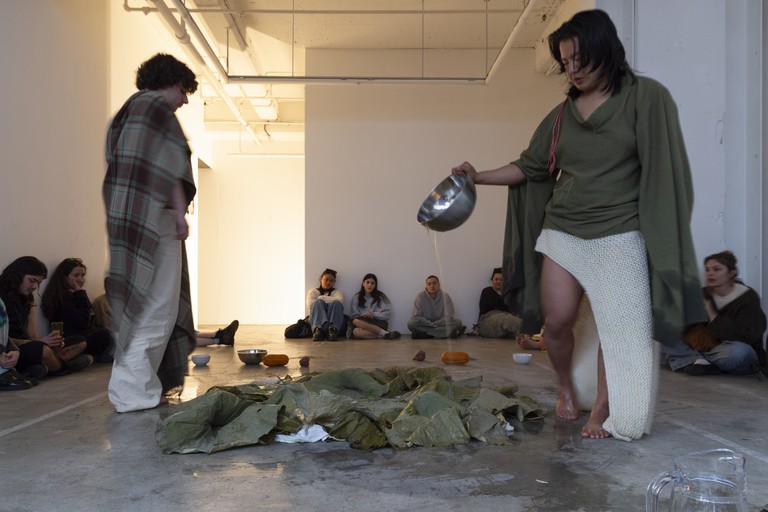
Frankie Millar and Jieying Cai, Hāngi, 2024. Image courtesy of Cheska Brown.
On Friday afternoon I watch as two artists boil and pour water onto a bed of harakeke, a ritual they share through different domestic practices. They tie each leaf to the sheet individually, taking deep breaths with each pour and fold. I think about the different paths each of us in this space today, differing historically and personally—each movement leading to the next, each action unknown until it ruptures the surface. Peggy Dunstan’s words repeat softly in my mind:
"You were like that last leaf
On the tree we thought inviolate
And the wind that carried you away
Has touched us all.
We sit seeking reassurance
In each other’s eyes, knowing
How vulnerable we are,
That there is nothing so impermanent as breathing."1
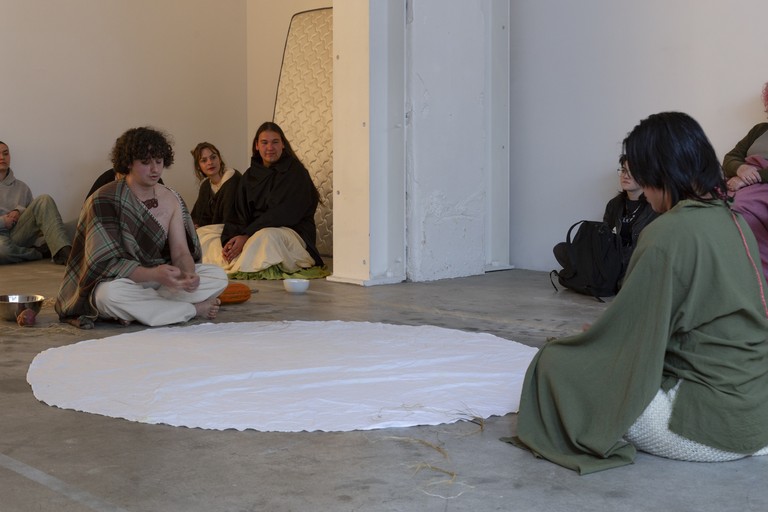
Frankie Millar and Jieying Cai, Hāngi, 2024. Image courtesy of Cheska Brown.
Today, we are a set of parts experiencing a whole, braided together by our commitment to being present and to carrying each other’s breath. Water in a perpetual stream spills onto these leaves, breaking into molecules as they float down the stems—each drop pushed by a breath until the ground is whole in its wetness. There is an old photograph of me as a child, my head through a giant hole in an oak tree. Its roots, formed by shared ground, had risen a metre high before separating into a giant circle, reconnecting at the top in unity. The performances are elemental in this sense, drawing us to the forces that bind us—water, breath, touch, landscape—each one shaped by our subjective experience.
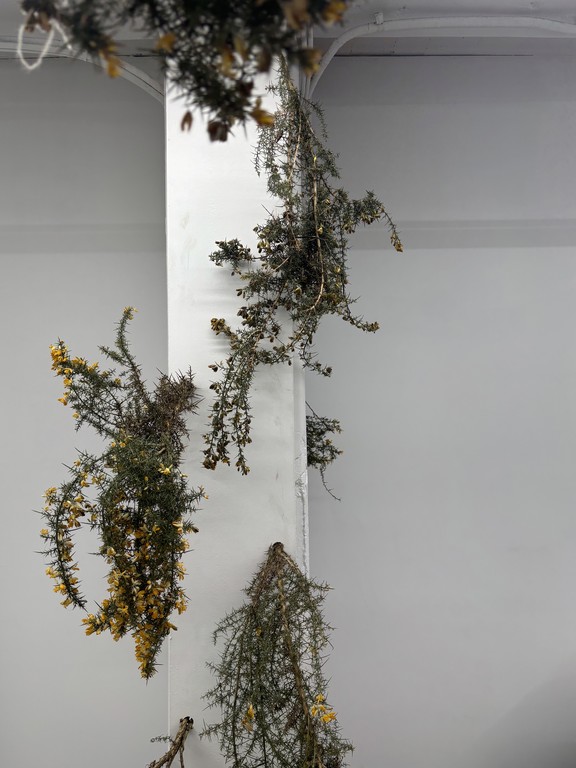
Jack Ellery, C U T Gorse, 2024. Image courtesy of DJCS.
The gallery space becomes a moving object with porous boundaries, inviting us to examine our ritualistic movements through collective witnessing. Folding turns to grasping, footsteps to hands held, words to tears, a branch dropped to a branch thrown. Each gesture propelling the next. I imagine myself barefoot in this circuit, hoping warm water would land on my foot, transforming me into a leaf, repeatedly washed in a relationship of sincerity.
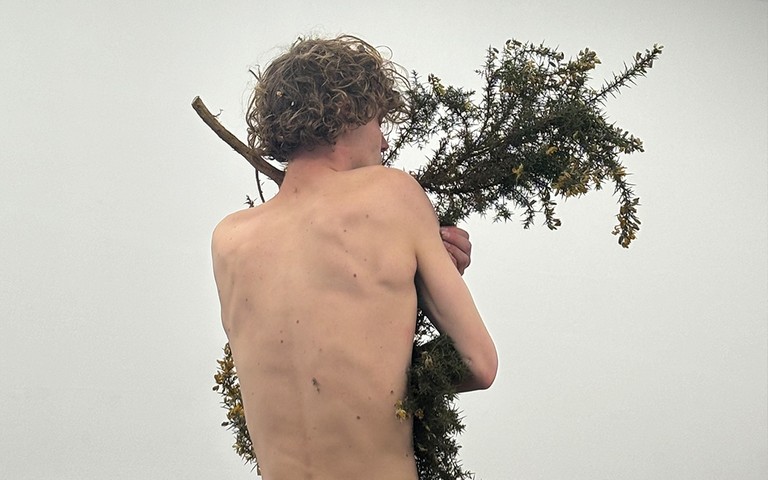
Jack Ellery, C U T Gorse, 2024. Image courtesy of DJCS.
At 2pm, I watch as a spider waddles along the spiked gorsey-terrain. Twice, Jack’s foot comes close to squashing it, and I wince each time. The spider, an introduced species to this space, like my Pākehā heritage in Aotearoa, holds my focus. I wonder who else sees it, and if anyone knows what kind of spider it is. Jack picks up the spider and tosses it lightly across the room. His body now moving beneath a beast-like gorse structure, prickly fur and bloated skin holding bulbs of blood that reflect a bark-like presence from below ground.
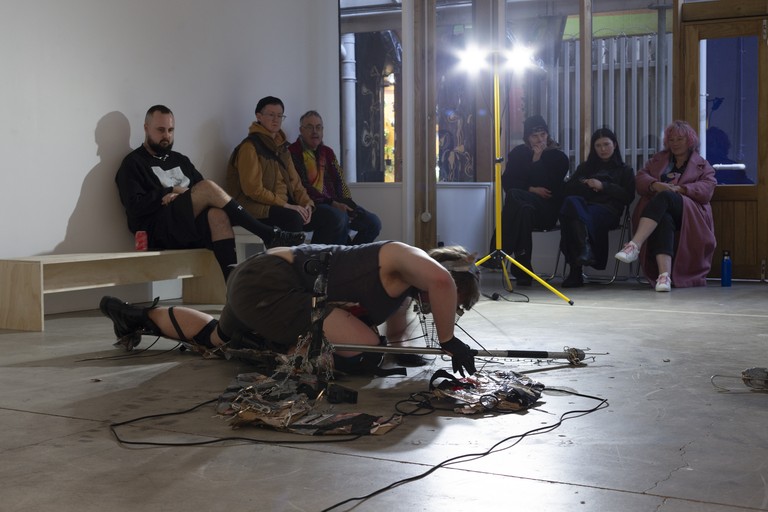
Cassie Freeth, Manticore, 2024. Image courtesy of Cheska Brown.
My thoughts shift to my colonial presence, its history and continuation of pain. As I witness the movement, I feel my breath echo against the walls, my muscles arching over this chair. The concrete stained with Jacks blood, now echoes the sound of Freeth’s body tumbling over and over it again, a constant encounter between body and material, movement that refuses to cease. The present is now a transient state, a soft ache carried by all of us. In this shared experience, movement refuses a settled condition, leaving a residue that lingers long after the performance.
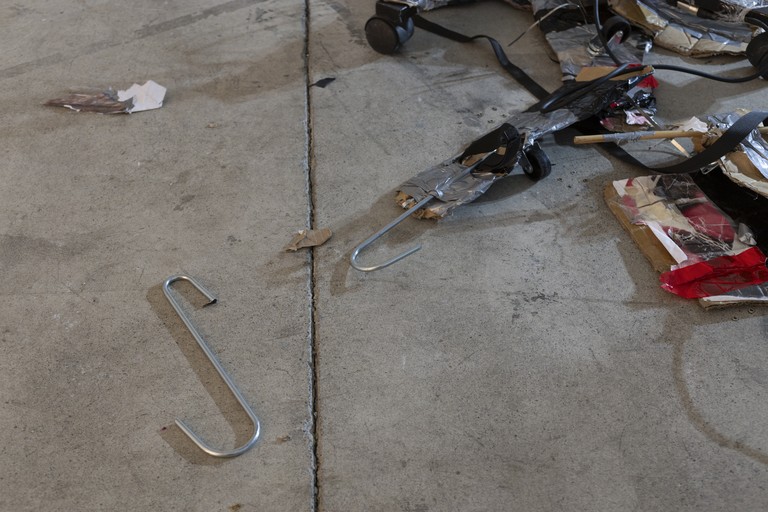
Cassie Freeth, Manticore, 2024. Image courtesy of Cheska Brown.
Over thirty-two hours, I watch people outside the gallery pause their commute, staring from meters away at the movements inside, calling back to friends. The gallery becomes a nucleus, its borders expanding and contracting as people pass by. I wonder how many of them went home and retold what they saw, regenerating the movements into new forms, the performance continuing beyond the gallery. I wonder if the child that encountered a blanket of soft plastic with human fingers went on to relay the words of her mother about our declining environment at school. When I was very small, I woke up from a nightmare. My mother, leaving the room and returning with a single strand of hair, wraps one end around my finger and one around hers. The hair, which is almost invisible, ties us together. She says “wherever you go you are tied to me, even if you can’t see we will always be connected because I can feel you moving”. Space becomes something unseen, yet constantly forming through the bodies entwined with it.
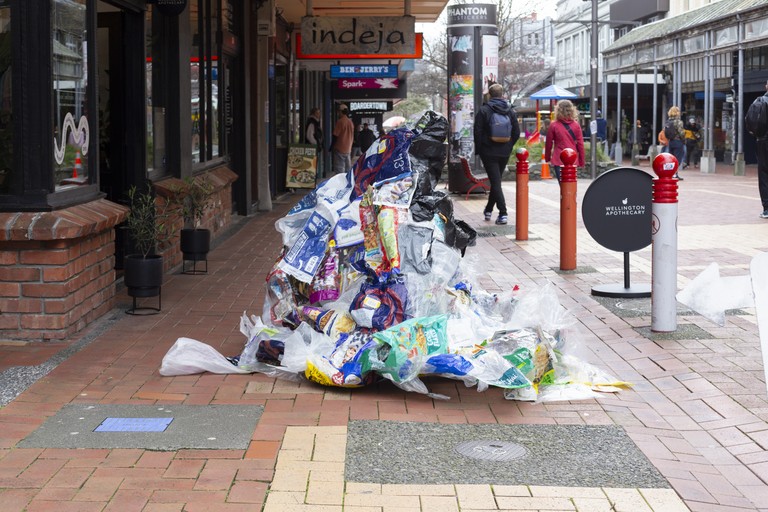
Willa Cameron, Urban Tumbleweed, 2024. Image courtesy of Cheska Brown.
On Saturday night, a friend told me they had seen a beetle wandering the gallery floor, but not the spider. Somewhere, they both wander the landscape, unknowing their presence has stamped our memory. It is our collective desire to communicate and gather that allows the present to become a shifting entity—an unfixed sculpture of movement and dialogue. Each action a sign within our auto-motion, a glimmering pastness existing in the present.
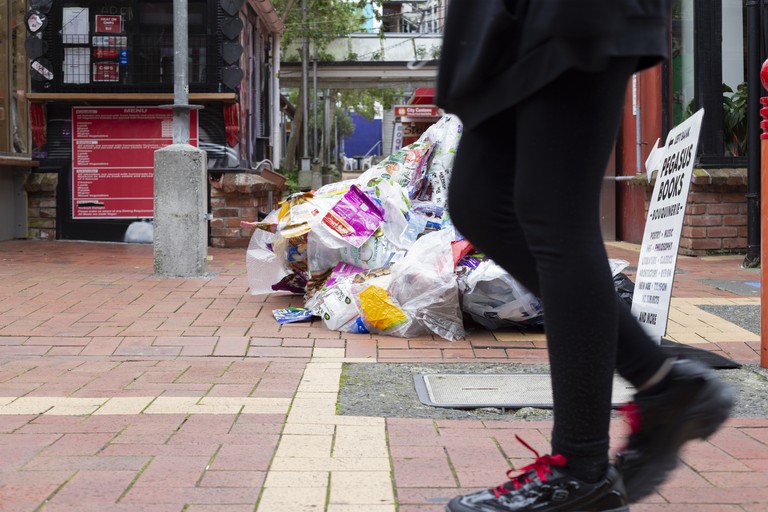
Willa Cameron, Urban Tumbleweed, 2024. Image courtesy of Cheska Brown.
ABOUT THE AUTHOR
Mia McIvor is an artist and writer living in Wellington. Mia completed her BA in Art History at Victoria University Wellington, and went on to study Fine Arts and Massey University Wellington. Her work is mainly concerned with presence, memory and materiality.
-
1.
Dunstan Peggy, A Particular Deep, Christchurch: Pegasus Press, 1974.
